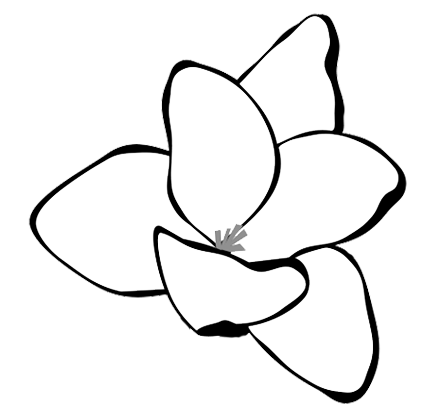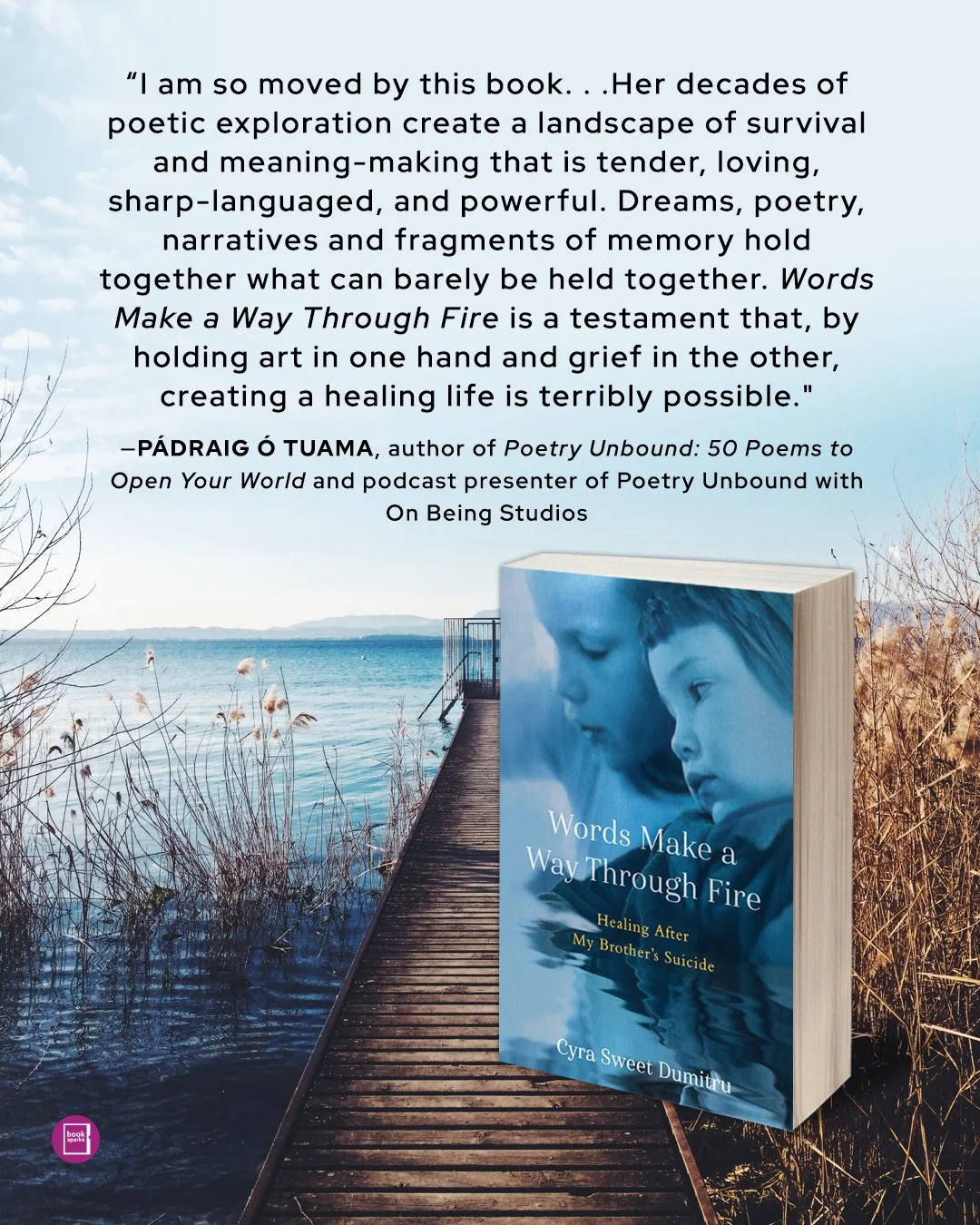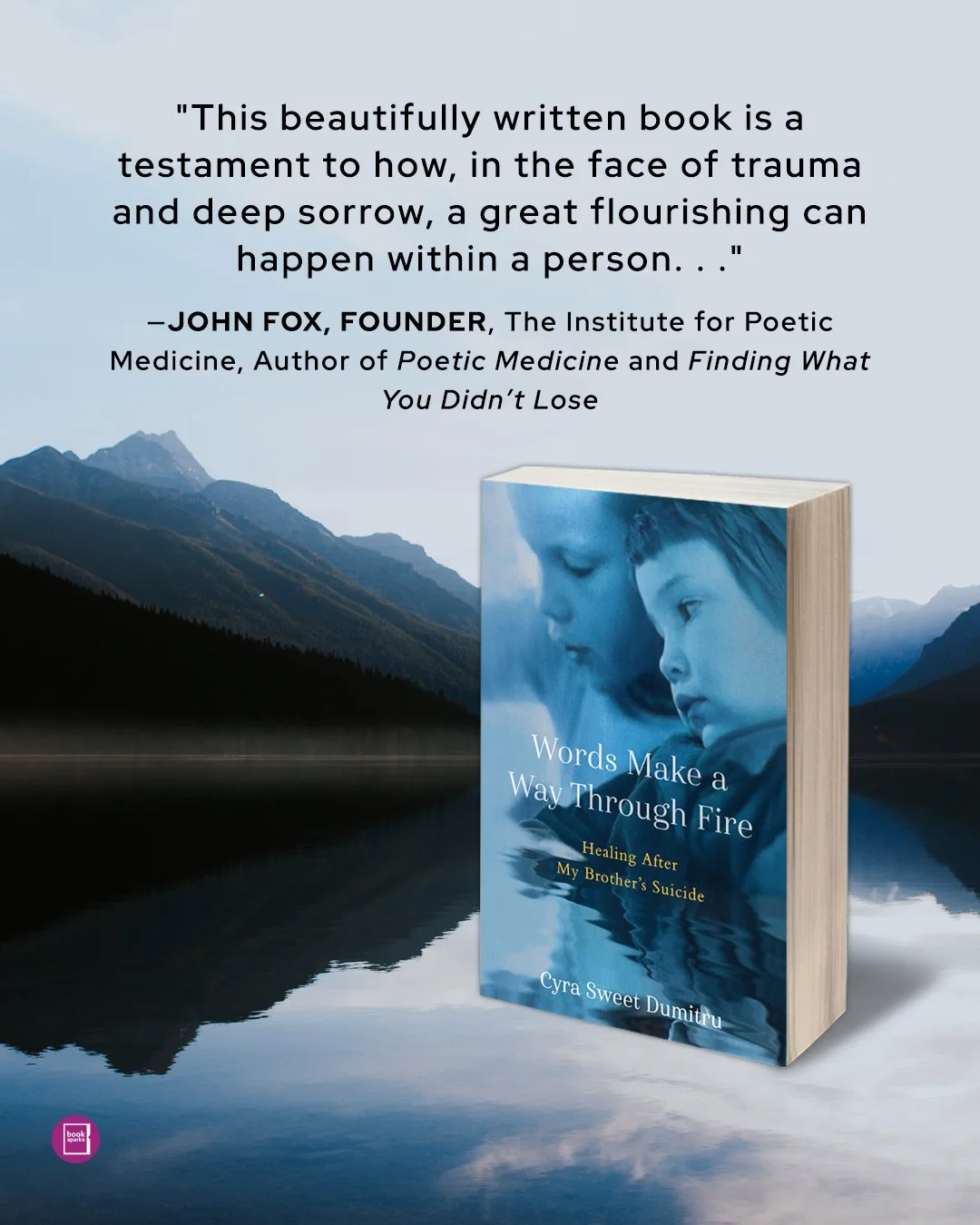Words Make A Way Through Fire
Healing After My Brother’s Suicide
"Cyra Dumitru has written with profound heart and soul for so many years, and this is her most crucial, personal work yet. With a voice that always illuminates, then heals, she offers her family’s own difficult story with grace and love."
—NAOMI SHIHAB NYE, recipient of 2024 Wallace Stevens Award for Lifetime Achievement, Academy of American Poetry
“Cyra Dumitru has carved a path of exquisite vulnerability and strength, allowing language to be both salve and compass. This book is a map for those navigating their own fires, finding their way through ashes to the clarity of their own voice.”
— SUZANNE ANDERSON, Author of You Make Your Path by Walking: A Transformational Field Guide Through Trauma and Loss
Words Make a Way through Fire is an intimate, courageous memoir of a woman shattered by witnessing her eldest brother’s horrific suicide when she was a teenager. The book traces her creative journey of recovery and healing with poetry as a constant companion.
The primary means of Cyra Dumitru’s healing process, from age sixteen through adulthood, is writing poetry and journaling. During this decades-long journey, Cyra experiences a transcendent, loving presence called Voice who guides and helps her imagine wholeness. She finds community with others through the sharing of poems. She studies poetry as craft and as medicine—becoming a published poet with multiple books, an award-winning college instructor of poetry writing, and a certified practitioner of poetic medicine who creates spaces where others can heal through poetry.
She also discovers the centering influence of swimming: how the rhythmic movement becomes soothing and meditative, bringing her back to her whole body. Swimming too becomes an enduring practice, a way of overcoming dissociation and processing tangled emotions nonverbally.
In Words Make a Way through Fire, Cyra explores the specific medicinal properties of poetry—giving order to interior anxiety, finding perspective through metaphor, trusting the wisdom within—and invites her brother David to speak through her as he reflects upon his final hours. In doing so, poem by poem, she shifts gradually from being traumatized and feeling haunted to feeling empowered and spiritually expansive.
Pre-Order Now
Poetic excerpts from
Words Make A Way Through Fire
My Brother’s Cup
Amidst chipped porcelain and stained coffee mugs
stacked in Mother’s cabinet, glints my brother’s silver cup.
I reach for it, follow his engraved name
and date of his birth with my finger, pause—
memory of his self-inflicted death flares. Settles.
It is good to find you here after years of reckoning.
I open the water, rinse away traces of dust, fill
my brother’s cup. The water I drink now is cool and clear.
Cyra Sweet Dumitru
Bird of Witness
When I was six, learning to write was first about drawing shapes:
circles and lines that looked like twigs fallen from our backyard tree.
It was about paying attention to how we filled space,
making our marks, learning to erase gently
so that we didn’t tear holes in the wide-lined paper.
The weeks progressed and we connected the shapes,
forming the very letters that we had sung about as “alphabet”.
We were makers! Tiny animals with spines and bellies,
tails and round heads, thrusting legs and rounded hips
sprang from our fingertips. They lined up side by side
and vibrated the names of things: bird, tree, flying.
I had not seen this coming.
One day when I was home from school and feeling lonely,
the bird nesting inside my mind wanted a new tree to sing from;
it poked and poked my fingertips with its beak.
Find a pencil, find some paper.
I tore out a page with wide lines from my tablet.
I found a pencil. My fingers led me as I followed
the sounds stringing together an image from my mind.
Words whispered. Then it happened.
As I wrote “b – i – r –d”, one blue wing –
another – then a small, sharp beak –
rubbed an opening through my mind
through my fingers into the kitchen air
until an entire bird appeared; it was blue and singing.
Perched upon a leafy branch, it sang and sang a blue
so real that my brother hurried into the room,
sat down and strummed along with his guitar.
Cyra Sweet Dumitru
The Faceless Day
I awake one morning to find I have no face.
It mocks me in the corner.
I move to claim it. Like a snail
it creeps up the wall to the ceiling
and glares, upside down.
What have I done to deserve such treatment?
I try to cry,
but I have no lips, no tongue, no throat or teeth.
I can merely stamp my feet.
"You are too cruel to yourself," my face replies.
"I can't connect with you; I do trust my instincts."
I stand on a chair, yank down my face
by the hair and fasten it to my neck.
"We'll try it your way." But I can't move.
"I don't know what to do!"
"Write then, you fool," calms my face.
And in between the lines and loops of W's,
I find a bug no bigger than my eyelash
who brashly swears it is my instinct.
Desperate, I swallow it. Goes down smooth.
There are no cymbals, no flashing lights,
just a whir in the shadows.
Cyra Sweet Dumitru
“Words Make a Way through Fire is a stunning journey of fifty years of crafting poetry and prose from pain, full of psychological metaphor and swimming in imagery that captures the reader from the first paragraph.”
Alicia B. Bridgeland, PsyD, Clinical Psychologist
Prose excerpt from
Words Make A Way Through Fire
Chapter 1: The Grounding of Water in Early Childhood Greenwich Point, Connecticut, 1961
Ocean fills my child-sight
flows forward, forward
Waves tumble and vanish,
fall back into the gleaming—
surge forward again
breathing in and breathing out …
Is that my name
sounding upon the wind?
Constant movement of waves reaches me—splashes over small bare feet, soothing then unsettling the sand where I stand. The wave ends, the ocean seems to end. But then, the broken wave regathers and slides back, back into the larger shining body that goes on forever, fills all that I see.
Everything before me breathes, cascades, gleams. Breaks and remakes itself.
Feel of Mother’s hand, warm sound of her voice as she calls to my two older brothers running into the waves—swimmers already. They disappear into the glistening expanse then surface, laughing and splashing. My younger brother drops behind me into the sliding foam, clutches a sleek strand of seaweed.
Waves ripple toward me. Can I outrun them as they chase me? Can I turn and chase them back to the ocean?
Sometimes when we arrive at the beach, the sea looks far away, as if considering its depths privately, whispering to itself. I can walk and walk the wet sand without holding anyone’s hand. Other times, the sea roars up the beach, shouting out its story; mesmerized, I watch and listen.
Here is origin, where I begin, within and alongside the ocean, place of momentum and rhythms of language.
Place of wholeness as if the sounding ocean holds the horizon and all of us together.
Place of first knowing that I belong to a body called family.
Here is the imprint of voice—voice of Mother reading stories and poems aloud by summer’s day. At night, there is voice of Father inventing stories told around a campfire. Always in the background breathes the unfurling waves along the shore.
Here is power of circle, being part of a family circle gathered for meals, campfires, and listening to stories after swimming the shining, tugging sea.
Here my body discovers pull of tides and currents—learns how to swim.
The ocean is both perfection and danger: alive and summoning me into its depths, where gentleness of current swirling at my ankles becomes stronger when felt at the knees and overwhelms suddenly when the sand falls away.
The world is pure wave carrying me into the distance, away from everything solid and familiar, away from everyone who knows my name. For a measureless moment I am lost. Until another wave sweeps me toward shore, where I find ground again.

What Writing My Memoir Has Made Deeply Clear to Me: Core Themes
Processing trauma takes time, consistent and nonjudgmental support, and the expressive arts. Traumatized people need much tenderness, patient understanding, safe spaces to speak and to move, and creative outlets.
Poetry writing and personal journaling offer unique healing properties for people who are processing trauma, shock, violence, depression, and a shattered sense of identity and security. It helps to rebuild trust when people can share their story consistently with a supportive, affirming community.
Loving spiritual presences are real if we are open, and imaginative. They can express love and support to us human beings during our wounding experiences and our ongoing healing processes. These spiritual presences transcend any particular religion though they may be connected to religious practices and beliefs. We need to be open to mysterious surprises not bound by logic nor by preconceived religious images.
A practice of sensuous, rhythmic movement such as swimming, yoga, walking, dance or Tai Chi can soothe, provide solace, loosen and ease tension, and ground someone who resonates with trauma.
People who live the aftermath of a loved one’s suicide need loving, nonjudgmental spaces for long periods of time. They are wrestling with a terrible tangle of loaded feelings such as shock, guilt, anger, shame, confusion, cognitive dissonance, horror at the chosen violence, grief and sorrow. It takes many years to detangle, reweave the self and relocate the changed self within this aftermath, this New World.




